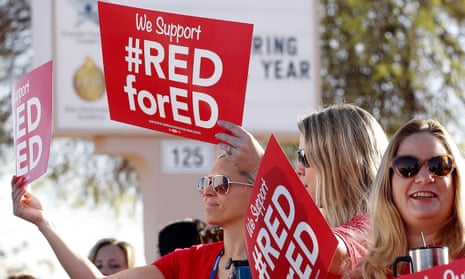As recently as Tuesday, a defiant Arizona governor refused to meet teachers threatening to strike over low pay and said he was sticking with a 1% raise proposal. Now Republican Doug Ducey has managed to scrape together the funds for what he claims is a 20% rise for teachers by 2020.
“It’s amazing what a threatened teachers’ strike in an election year can get the Republicans to do,” Democratic representative Rebecca Rios said. “I’m impressed.”
The moves comes amid a wave of teachers strikes over pay and education budgets in states including West Virginia, Arizona, Kentucky and Oklahoma.
The Great Recession forced legislatures nationwide to slash budgets and make major cuts across all spending areas. However, in Arizona, legislators also passed major corporate tax cuts designed to phase in as the economy recovered. As such, Arizona’s budgets are still exceptionally tight a decade after the recession.
In addition to a 20% pay bump, Arizona teachers also demanded a permanent raise structure, a $1bn boost to put education funding at pre-recession levels and no more tax cuts until per pupil spending matches the national average.
Ducey was vague about where the cash would come from, only saying a growing economy and lower spending in other areas unexpectedly freed up $274m this year that can be used to fund the raise. He has also said he would cancel some of the planned spending in his budget and use savings from government efficiencies.
Teachers who organized a grassroots effort that drew nearly 45,000 members were cool to the announcement, saying they wanted details before reacting and lacked trust in the governor.
“What he gave us today was just a proposal, it wasn’t legislation, and we don’t know where the money’s coming from and we don’t know if he’s talking about everybody involved in education or just classroom teachers,” Tucson teacher and Arizona Educators United organizer Derek Harris said. “At this point there’s not really anything to trust.”
Arizona educators were encouraged in part by successful teacher walkouts in West Virginia and Oklahoma. Those teachers shocked their state’s leaders by surrounding their capitols and demanding funding after years of cuts, setting off similar feelings in other Republican states.
Earlier this week, the grassroots organization Arizona Educators United told their Facebook members to prepare for a possible walkout that would close schools.
On Wednesday, Arizona teachers and others held “walk-ins” at more than 1,000 schools to draw attention to their demands. Teachers, students and parents donned red and gathered outside campus before school began to demonstrate as part of the #RedforEd campaign.
Arizona teachers are among the lowest paid in the nation, with elementary instructors earning a median 2017 wage of $43,280 and high school teachers $46,470, the third and sixth lowest in the nation, respectively, according to the federal Bureau of Labor Statistics. Adjusted for local cost of living, federal figures show elementary teachers actually rank 49th in earnings and high school teachers 48th.
